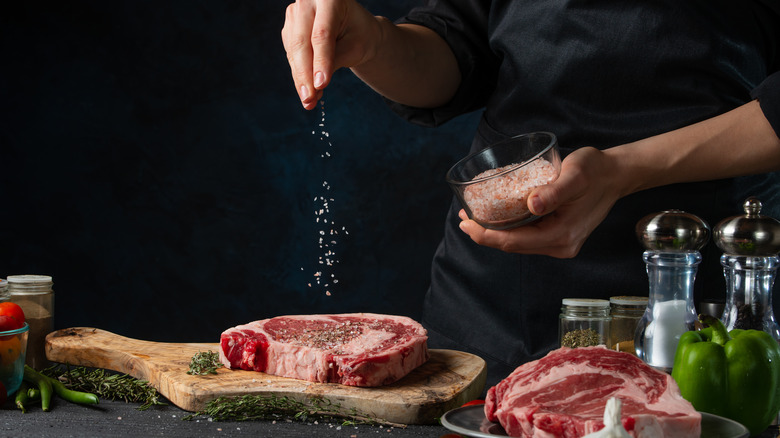The Way Meat Loves Salt
A father once asked his three daughters how much they loved him. The eldest said, “With all the warmth of the sun.” The second, “With the power of an ocean’s waves.” The youngest, after a moment’s thought, replied, “I love you the way meat loves salt.” Her father, shocked by her seeming non-answer, expelled her from the house. She wandered for years, eventually working at an inn. One day, years later, the father came in, not recognizing her. He complained about the tasteless meat, and she softly said, “Meat loves salt.” Upon hearing her voice, he realized his mistake. He had learned that, just as meat is tasteless without salt, his life was empty without her. They reconciled, and from then on, the purest form of love was understood as “the way meat loves salt.”
This week, we begin the book of Leviticus with Parashat Vayikra, which outlines the rituals of sacrifice and offerings to God. The first chapters are quite detailed, almost like a recipe book, explaining how to prepare various sacrifices and what parts of the animal are to be burnt or eaten by the priests. In Leviticus 2:13, it says, “You shall season your every offering of meal with salt: you shall not omit the salt of your covenant with God; with all your offerings you must offer salt.” The fact that the word for salt, “melach,” is repeated four times in this verse highlights its importance. Salt, as we see in the Torah, is not just for flavoring—it is a key part of the covenant between God and the people of Israel.
Rashi explains that the “Salt of your covenant with God” traces back to the beginning of creation when the lower waters, the oceans, were assured that they would be offered on the altar in the form of salt. Salt, therefore, is not only a symbol of flavor but also of promise, preservation, and eternity. It has the unique quality of never spoiling—whether mined from the earth or harvested from seawater. It stands as a constant, reminding us that our connection to God is meant to be eternal. Salt preserves food, but it also symbolizes the enduring nature of our relationship with God, which lasts far beyond the fleeting moments of consuming the food itself.
Reflecting on this idea, I am reminded of some of my most enduring and meaningful relationships, particularly those formed during my Year in Israel with my cantorial classmates. We spent countless hours learning, praying, and traveling together, but one of the strongest bonds we formed was through sharing meals. I think of moments like sitting outdoors at Café Alma in Gan HaAtzmaut, enjoying shakshuka halloumi with Cantor Ilana Goldman, counting each golden cube of cheese to make sure it was a fair split; or shopping in Shuk Machane Yehuda with Cantor Stefano Iacono, hunting for injera to accompany his Ethiopian lentils. One of my most vivid memories is from a trip with our teacher, Jeremy Leigh, to a bourekas stand on the edge of the shuk. We devoured potato bourekas stuffed with long-cooked eggs and Jerusalem pickles as Jeremy explained how each ingredient—Turkish pastry, North African eggs, local pickles—represented a thousand years of Jewish history from various places converging at that very point in time. It was in these shared meals that our bonds deepened, each dish carrying with it not just nourishment, but memory and connection.
Food is more than just sustenance; it’s a vessel for social, cultural, and spiritual connection. How often do we gather over a meal to celebrate, to mourn, to reconnect? Sitting down to eat with someone is never just about the food—it’s about the shared experience, the stories exchanged, and the relationships nurtured. The act of eating together can bring us closer, not just to the people around us, but to our history, our traditions, and even to the divine.
In the context of Levitical sacrifices, the Hebrew word korban, often translated as “offering,” comes from the root word karav, meaning “to come close” or “to draw near.” Sacrifice, then, is not about loss but about drawing closer to God. One of my cantorial classmates, Cantor David Fair, writes that “If you can develop a prayer practice of offering kavod (honor) to the source of things you enjoy, not only do you honor that source, you honor the Source of all being.” He imagines a world in which we consciously acknowledge the origins of our food, the relationships we cherish, and the spaces we inhabit. This awareness, he believes, brings us closer to God.
Salt plays a key role in this. While we may not eat salt all by itself, it enhances the flavors of the foods we love. In the same way, kavannah—intention—enhances our relationships. Without intention, even the deepest bonds lose their meaning. Yet, without relationships, intention becomes hollow. Just as meat is tasteless without salt, our lives lack depth without intentional relationships.
In the spirit of Parashat Vayikra, let us consider how we can infuse our relationships with intention. Let us think about the people we love, and how we bring meaning to those connections. And as we gather for meals, let us remember that the act of sharing food is an opportunity to draw closer to one another—and to the divine.

